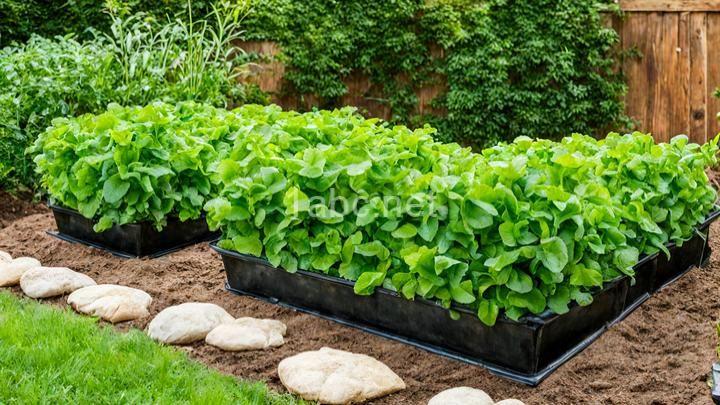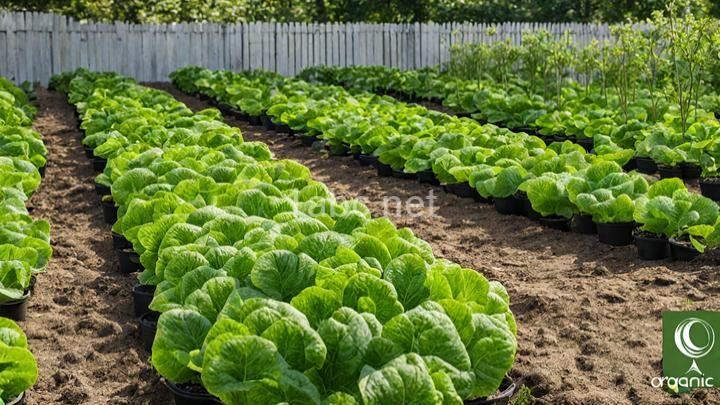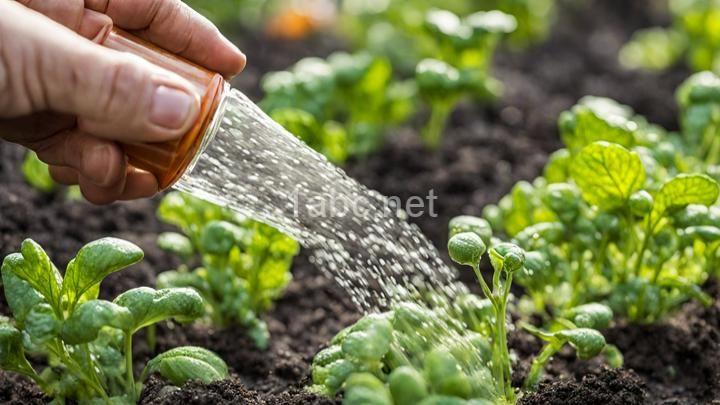The Benefits of Composting for Organic Gardening

Introduction:
- Hook: Are you looking for a natural and sustainable way to improve your organic gardening?
- Brief explanation of composting and its relevance to organic gardening.
- Thesis statement: Composting offers numerous benefits that can enhance the health and productivity of your garden.
Are you tired of spending money on expensive fertilizers and pesticides for your organic garden? Do you want a natural and sustainable solution that will improve the health and productivity of your plants? Look no further than composting! Composting is a simple and effective way to create nutrient-rich soil amendments that can revolutionize your organic gardening journey. In this blog post, we will explore the various benefits of composting and how it can transform your garden into a flourishing paradise.
I. Nutrient-Rich Soil Amendment
When it comes to organic gardening, the quality of the soil is paramount. Compost, often referred to as "black gold," is a nutrient-rich soil amendment that can provide your plants with the essential elements they need to thrive. Compost contains a diverse range of nutrients, including nitrogen, potassium, and phosphorus, which are all vital for healthy plant growth. These nutrients are released slowly and steadily, ensuring that your plants receive a continuous supply of nourishment.
Imagine your plants growing taller, greener, and more vibrant than ever before. This is the power of compost! By incorporating compost into your garden, you are providing your plants with the building blocks they need to develop strong roots, robust stems, and abundant foliage. The result is healthier plants that are more resistant to diseases and pests.
One successful organic gardener, Sarah, shares her experience with composting: "I started composting a few years ago, and the difference it has made in my garden is incredible. My plants are thriving, and I rarely have to use any additional fertilizers. Compost truly is nature's magic potion!"
II. Enhances Soil Structure and Moisture Retention
In addition to its nutrient content, compost also improves the structure of the soil. When added to the garden, compost increases the porosity of the soil, allowing for better air circulation and water drainage. This is especially beneficial in clay or compacted soils, which tend to become waterlogged and suffocate plant roots.
Imagine a garden with soil that is light, airy, and crumbly. This is the result of incorporating compost into your gardening routine. The improved soil structure promotes better root development, allowing plants to access oxygen and nutrients more efficiently. It also prevents waterlogging during heavy rains, reducing the risk of root rot and other water-related issues.
Moreover, compost acts as a sponge, helping the soil retain moisture during dry periods. This is particularly advantageous in regions with limited rainfall or during periods of drought. The ability of compost to hold moisture within the soil reduces the need for frequent watering and ensures that your plants stay hydrated even in challenging conditions.
III. Suppresses Plant Diseases and Pest Infestations
One of the lesser-known benefits of composting is its ability to suppress plant diseases and pest infestations. Compost contains beneficial microorganisms, such as bacteria and fungi, that act as natural protectors of your garden. These microorganisms outcompete harmful pathogens, preventing them from taking hold and causing diseases.
Imagine a garden free from the relentless attack of pests and diseases. This is the power of compost! By incorporating compost into your soil, you are creating an environment that is unfavorable to pests and diseases. This reduces the need for chemical pesticides and herbicides, making your garden a safer and more sustainable place for both plants and beneficial insects.
Take it from Mark, an organic gardener who has experienced the benefits of compost firsthand. "I used to struggle with aphids and powdery mildew in my garden. Since I started using compost, these issues have become a thing of the past. Composting has saved me time, money, and the frustration of dealing with constant pest problems."
IV. Reduces Environmental Impact
Composting not only benefits your garden but also has a positive impact on the environment. By composting your organic waste, you are diverting it from landfills, where it would otherwise contribute to methane emissions. Methane is a potent greenhouse gas that significantly contributes to climate change. By composting, you are playing a part in reducing these emissions and mitigating the effects of global warming.
Furthermore, composting is a form of responsible waste management. Instead of throwing away valuable organic matter, you are turning it into a valuable resource for your garden. This reduces the need for chemical fertilizers, which often have negative environmental consequences. By using compost, you are promoting sustainability and taking a step towards a greener future.
Conclusion:
Composting offers numerous benefits that can enhance the health and productivity of your garden. From enriching the soil with essential nutrients to improving soil structure and moisture retention, composting is a game-changer for organic gardening. Additionally, composting suppresses plant diseases and pest infestations, making your garden a haven for healthy plants and beneficial insects. Lastly, composting reduces your environmental impact by diverting organic waste from landfills and reducing the need for chemical fertilizers.
So, what are you waiting for? Start your own composting journey and witness the incredible transformation in your organic garden. Share your composting success stories or ask questions in the comments section below. Together, let's create a greener and more sustainable future, one compost pile at a time!
FREQUENTLY ASKED QUESTIONS
What should I avoid composting?
When it comes to composting, there are certain things you should avoid adding to your compost pile. Here are some items that are best kept out of your compost:
-
Meat and dairy products: These items can attract pests and create unpleasant odors in your compost. It's best to avoid adding them to maintain a healthy compost environment.
-
Oily or greasy foods: Foods like salad dressings, cooking oils, and butter can slow down the composting process and create a clumpy, smelly mess. It's better to avoid adding these to your compost pile.
-
Animal waste: While manure can be an excellent addition to compost, it's important to avoid adding pet waste or waste from carnivorous animals like cats and dogs. These can contain harmful pathogens and parasites that may not break down effectively during the composting process.
-
Diseased plants: Plants that have been infected with diseases should be kept out of your compost pile. The composting process may not kill the pathogens, and they could potentially spread to other plants when you use the compost in your garden.
-
Weeds with seeds: While many weeds can be composted, it's important to avoid adding weeds that have gone to seed. This can lead to the spread of weed seeds in your compost and potentially cause weed problems in your garden later on.
-
Synthetic materials: Items like plastic, metal, glass, and synthetic fabrics should not be composted. These materials do not break down and can contaminate your compost.
Remember, a healthy compost pile needs a balance of organic materials, water, air, and microorganisms to break down effectively. By avoiding these items, you can ensure that your compost remains healthy and beneficial for your plants and garden.
How long does it take to make compost?
The time it takes to make compost can vary depending on various factors. On average, it can take anywhere from a few months to a year for compost to fully mature. However, several factors can influence the composting process and its duration.The first factor to consider is the type of materials used in the compost pile. Composting primarily involves organic matter such as kitchen scraps, yard waste, and leaves. Materials that are smaller in size and have a higher nitrogen content, like fruit peels and grass clippings, tend to decompose faster than larger items such as branches or wood chips. Mixing a variety of materials can help speed up the process.
Another crucial factor is the balance of carbon and nitrogen in the compost pile. A proper balance of these elements, known as the carbon-to-nitrogen ratio or C:N ratio, is essential for efficient decomposition. A C:N ratio of about 30:1 is ideal for composting. You can achieve this by combining carbon-rich materials (such as dried leaves or straw) with nitrogen-rich materials (such as kitchen scraps or grass clippings). Maintaining this balance helps provide the necessary nutrients for microorganisms to break down the organic matter.
The size of the compost pile also plays a role in the composting timeline. A larger pile can generate more heat, which accelerates the decomposition process. However, it's important to ensure proper aeration and moisture levels within the pile to promote microbial activity. Turning or mixing the compost regularly allows oxygen to reach the microorganisms and helps maintain an optimal moisture level.
Environmental conditions can affect composting as well. Temperature, moisture, and airflow all impact the speed at which organic matter breaks down. Composting tends to occur more rapidly in warmer temperatures, with the optimal range being between 120°F and 160°F (49°C and 71°C). However, it is possible to compost at lower temperatures, albeit at a slower rate. Similarly, maintaining a moist but not overly wet environment helps facilitate decomposition.
By considering these factors and managing your compost pile effectively, you can expedite the composting process. Regular monitoring and adjustments can help you achieve nutrient-rich compost for your gardening needs. So, while the exact time may vary, with the right conditions and care, you can expect your compost to be ready within a few months to a year.
How do I use compost in my garden?
Using compost in your garden is a great way to nourish your plants and improve soil health. Here are some steps to help you effectively use compost in your garden:
-
Start by preparing your soil: Before adding compost, remove any weeds or debris from the area where you plan to use it. Loosen the soil with a garden fork or tiller to ensure better absorption and distribution of nutrients.
-
Determine the amount of compost needed: The general rule of thumb is to add about 2 to 4 inches of compost to the top layer of your soil. This will provide a good balance of nutrients without suffocating the plants.
-
Apply the compost evenly: Spread the compost over the surface of the soil, making sure to cover the entire area. Use a rake or garden fork to gently work the compost into the top few inches of soil. This will help incorporate it into the existing soil and promote better drainage.
-
Consider compost placement: Depending on your needs, you can apply compost either to the entire garden bed or focus on specific areas where plants need extra nourishment. For vegetables and annual flowers, it's beneficial to spread compost evenly across the entire bed.
-
Water thoroughly: After applying compost, water your garden thoroughly to help settle the compost into the soil and activate its benefits. This will also ensure that the nutrients are available to the plant roots.
-
Maintain moisture levels: Compost helps retain moisture in the soil, but it's important to monitor moisture levels regularly. Water your garden as needed to prevent the soil from drying out too much or becoming waterlogged.
-
Repeat the process: To continue improving soil fertility, you can add compost to your garden annually or as needed. Regularly adding compost will help replenish nutrients and maintain a healthy growing environment.
Remember, compost is a natural and organic way to enrich your garden soil. It provides essential nutrients, improves soil structure, and promotes healthy plant growth. By incorporating compost into your gardening routine, you'll be well on your way to a thriving garden.
Can I compost if I live in an apartment?
Yes, you can definitely compost even if you live in an apartment! While having limited space may pose some challenges, there are still options available for apartment dwellers who want to compost their food waste and contribute to a greener environment.One option is vermicomposting, which involves using worms to break down organic waste. This method is perfect for small spaces as it can be done indoors. You can purchase a worm bin or even make one yourself using a plastic container. Simply add your food scraps and some bedding material like shredded newspaper or cardboard, and let the worms do their magic. They will turn your kitchen scraps into nutrient-rich worm castings, which can be used as fertilizer for your plants.
Another option is bokashi composting, a fermentation process that can be done indoors as well. With this method, you use a special bin and a mixture of beneficial microorganisms to break down your food waste. It's a bit different from traditional composting, as it doesn't require oxygen or heat. Once the fermentation process is complete, you can bury the fermented waste in a garden or transfer it to an outdoor compost bin to finish decomposing.
If you have access to outdoor space, you can also consider using a compost tumbler or a compost bin designed for small spaces. These compact containers allow you to compost your food scraps without taking up too much room. Just remember to regularly turn or mix the contents to ensure proper decomposition.
In addition to these methods, some cities offer community composting programs where residents can drop off their food waste at designated locations. This is a great option if you don't have the space or time to manage your own composting system.
Remember, composting is not only beneficial for the environment but also for your plants. The nutrient-rich compost you create can be used as a natural fertilizer to nourish your indoor or outdoor plants.
So, don't let apartment living stop you from composting! Explore these options and find the one that works best for you and your living situation. Happy composting!

